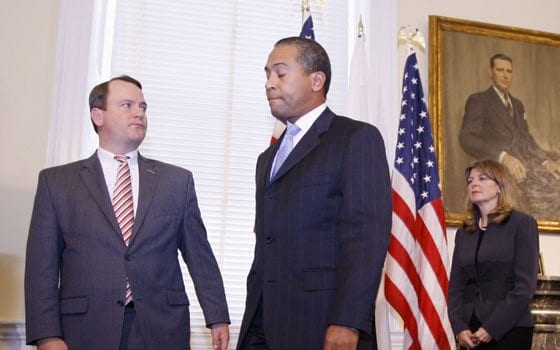
Gov. Deval Patrick said last Thursday he wants to merge the Massachusetts Turnpike Authority with other transportation agencies in a series of steps aimed at restructuring state finances amid sagging tax collections.
House Speaker Salvatore F. DiMasi and Senate President Therese Murray signaled they were open to the Turnpike merge, a sea change from the legislative roadblock faced by former Gov. Mitt Romney — a Republican — when he tried to accomplish the same task.
During a State House news conference, Patrick announced that tax collections were $223 million behind projections during the first quarter of the state’s fiscal year. He said he was concerned the trend would deepen as the national economy teeters on recession and the stock market gyrates in the aftermath of Wall Street bankruptcies, takeovers and bailouts.
The governor ordered a 7-percent cut in his own office budget — a reduction of about $600,000 — and encouraged other constitutional officers such as the secretary of state, auditor and treasurer to follow suit.
DiMasi and Murray upstaged Patrick by announcing a 10-percent cut in their collective budgets, a savings of $9.1 million.
Republican leaders, meanwhile, accused the governor and the Democratic majority in the Legislature of passing a bloated budget that now must be cut.
Patrick also ordered Administration and Finance Secretary Leslie Kirwan to reduce the size of expected tax receipts for the remainder of the year, a process that will give him legal authority to sit down with the eight executive offices under his control and seek budget cuts and staff reductions saving “hundreds of millions.”
Patrick said he wanted to be aggressive early in the fiscal year, while department budgets still contain about 80 percent of their annual cash.
“While these [revenue] numbers reflect only the first three months of this fiscal year, and are only a fraction of a percent of our total budget, I believe they are a signal of worse news ahead,” he said.
More broadly, Patrick plans to tap public anxiety about government spending by pushing for series of initiatives: dismantling the Turnpike Authority, consolidating state agencies, reforming the state and MBTA pension systems and containing health care costs.
Even if accomplished, the long-term initiatives would have no immediate impact on the state’s $28.1 billion budget.
“As disruptive as these actions may be, the circumstances demand action,” the governor said during a State House news conference. “If we take as much pain as possible now, it will be easier over the course of the year.”
In their joint statement, DiMasi and Murray said, “As state leaders, we have been watching these developments closely and understand it is imperative to act now and share the responsibility.”
In later meetings with reporters, both leaders said they were willing to discuss the Turnpike changes. Asked what had changed, the House speaker cited the ailing economy and the change in State House leadership after Patrick replaced Romney in January 2007.
“I think, actually, with a Democratic governor it’s a lot easier for us to agree with him that he has to change these things because it’s out of necessity,” said DiMasi.
The president of the pro-business Massachusetts Taxpayers Foundation, Michael Widmer, questioned the savings of any such move and said it might create political divisiveness at a time when lawmakers had to unite behind budget cutting.
The credit rating agency Moody’s Investors Services last Thursday downgraded the Turnpike’s bond rating citing in part “continued delayed decision-making on toll increases and the potential for traffic and revenue declines in a slowing economy.”
Massachusetts Turnpike Authority spokesman Mac Daniel said the downgrade was disappointing, but not unexpected.
“It’s further evidence of our serious fiscal situation at the Turnpike,” he said. “We further believe this supports the Governor’s recognition that real reform is needed at the Turnpike Authority.”
The Republican leaders of the House and Senate, state Rep. Bradley Jones and state Sen. Richard Tisei, said in their own joint statement that the state should institute a hiring freeze, begin no new programs and halt expansion of existing programs. They noted all their party members in the Legislature voted against the 2009 budget.
“The immediate problems that we’re facing today are not due solely to the events of the last few weeks, but more so as a result of overspending and lack of fiscal discipline earlier this year,” Jones and Tisei said.
Patrick said he envisioned some toll relief if he can eliminate the Turnpike Authority, but he did not say how that would be achieved or what effect assuming the authority’s Big Dig debt would have on the state budget. He said he would file legislation for the merger with his fiscal 2010 budget request in January.
The governor hinted he may take a second shot at legalizing casino gambling in Massachusetts, which DiMasi helped defeat earlier this year. Patrick had projected it would generate at least $600 million in one-time licensing fees and $400 million in annual tax revenues.
“I think we’ll have to see,” he said. “You know, it’s a new legislative session coming up in January.”
The governor said he would aim to avoid any cuts in state aid payments to cities and towns, as well as education assistance. Both are pivotal building blocks of municipal budgets.
“That is my last resort,” Patrick said, “because cutting local aid and Chapter 70 just leads to increases in [local] property taxes.”
(Associated Press)






